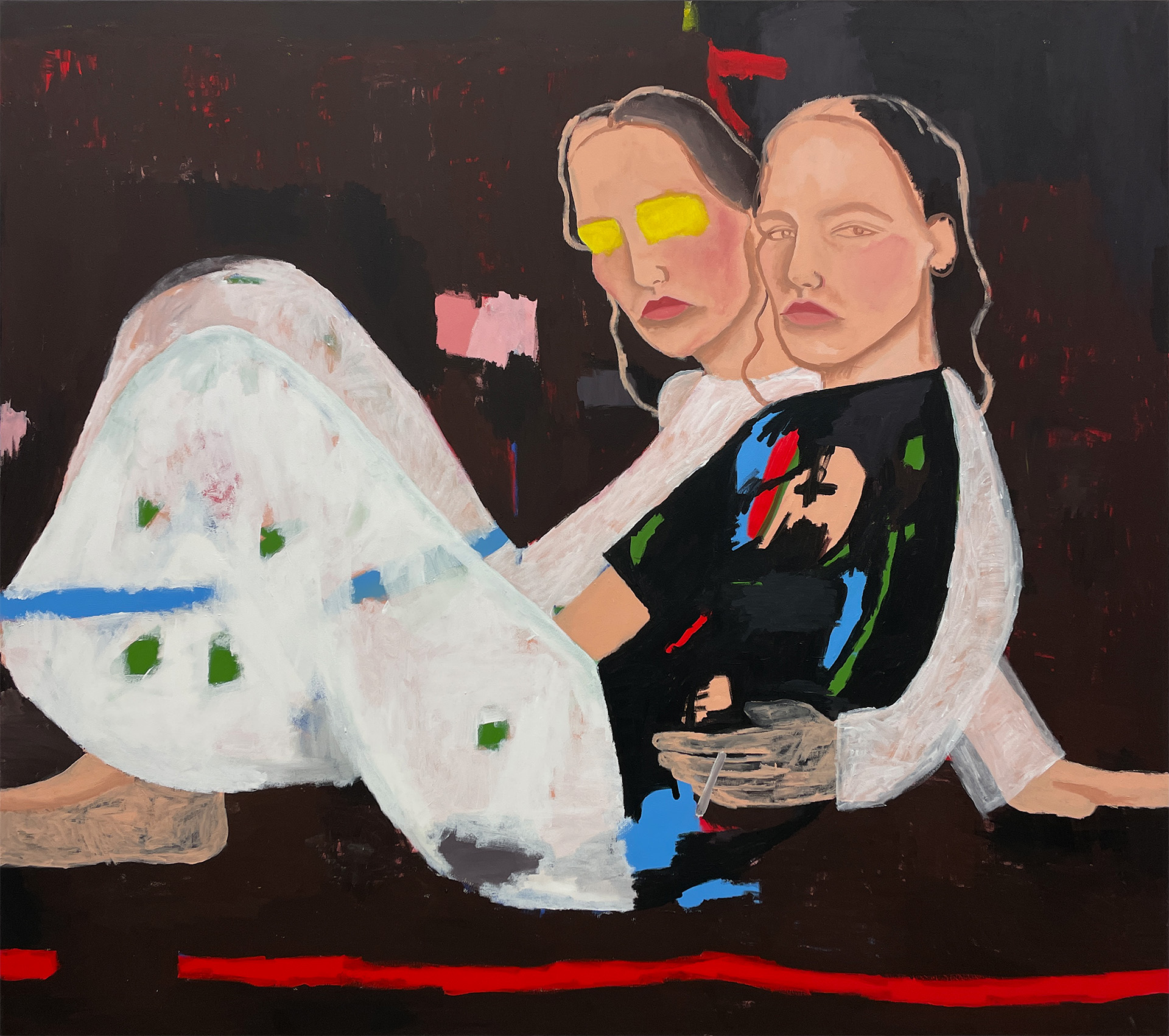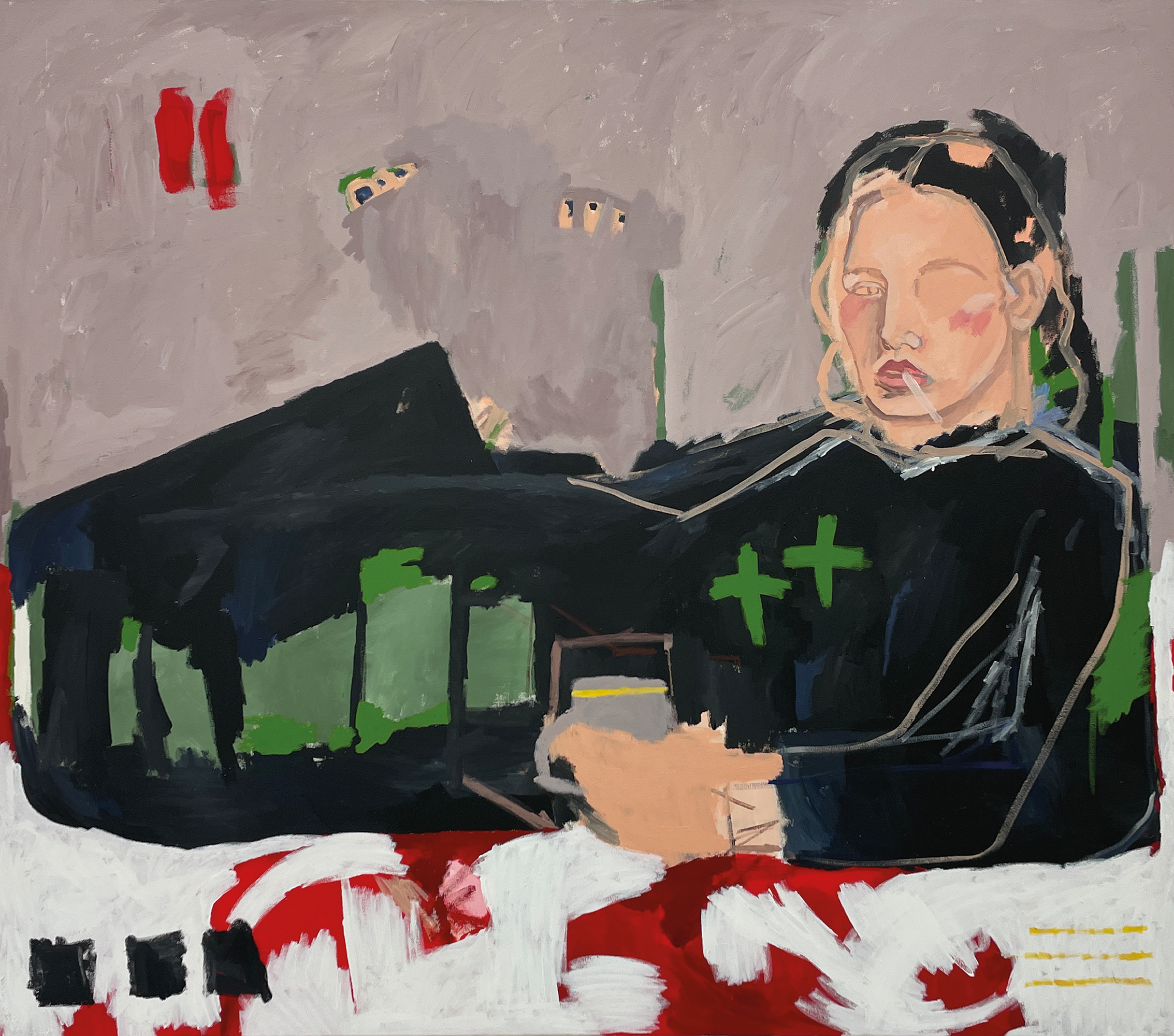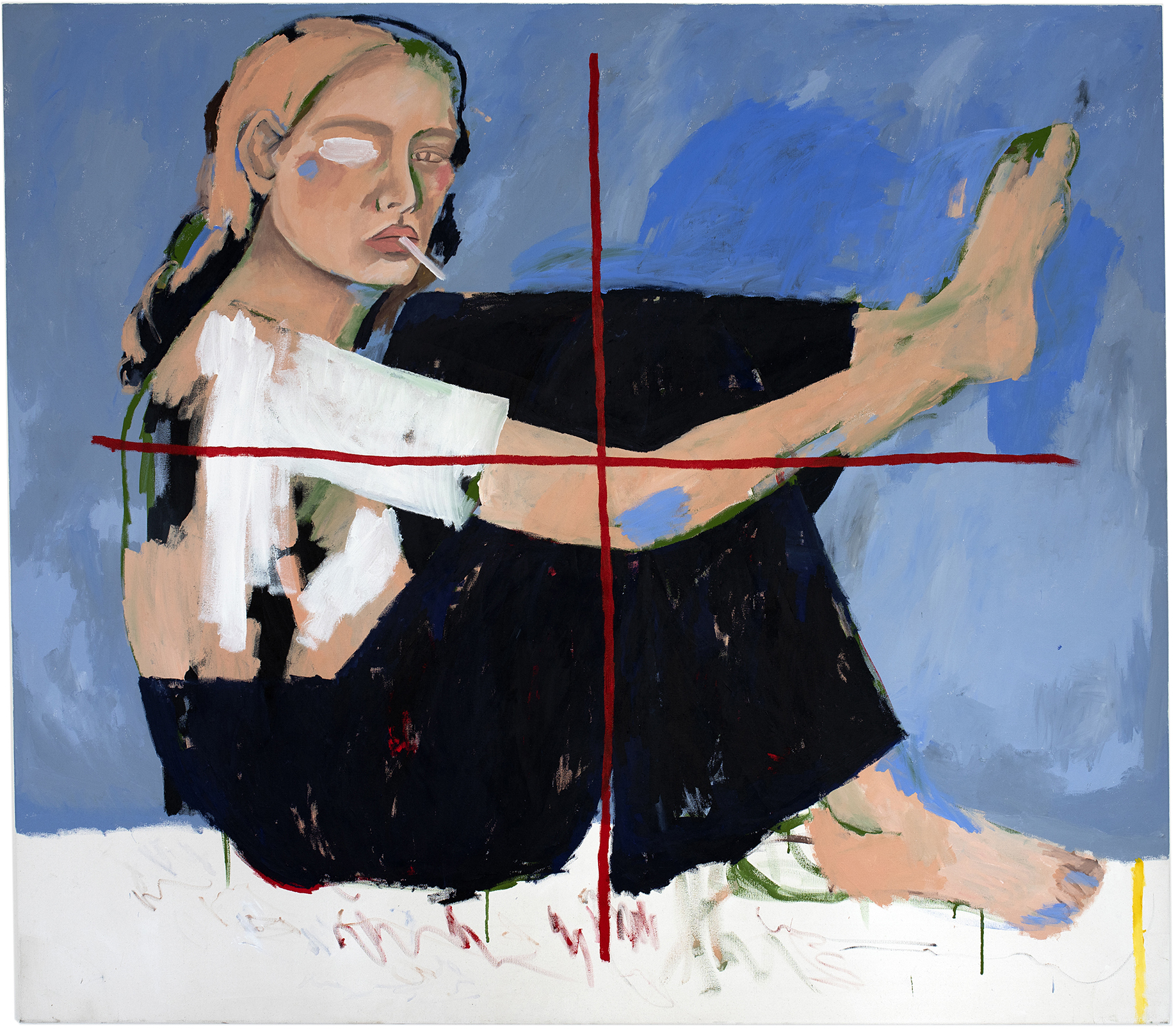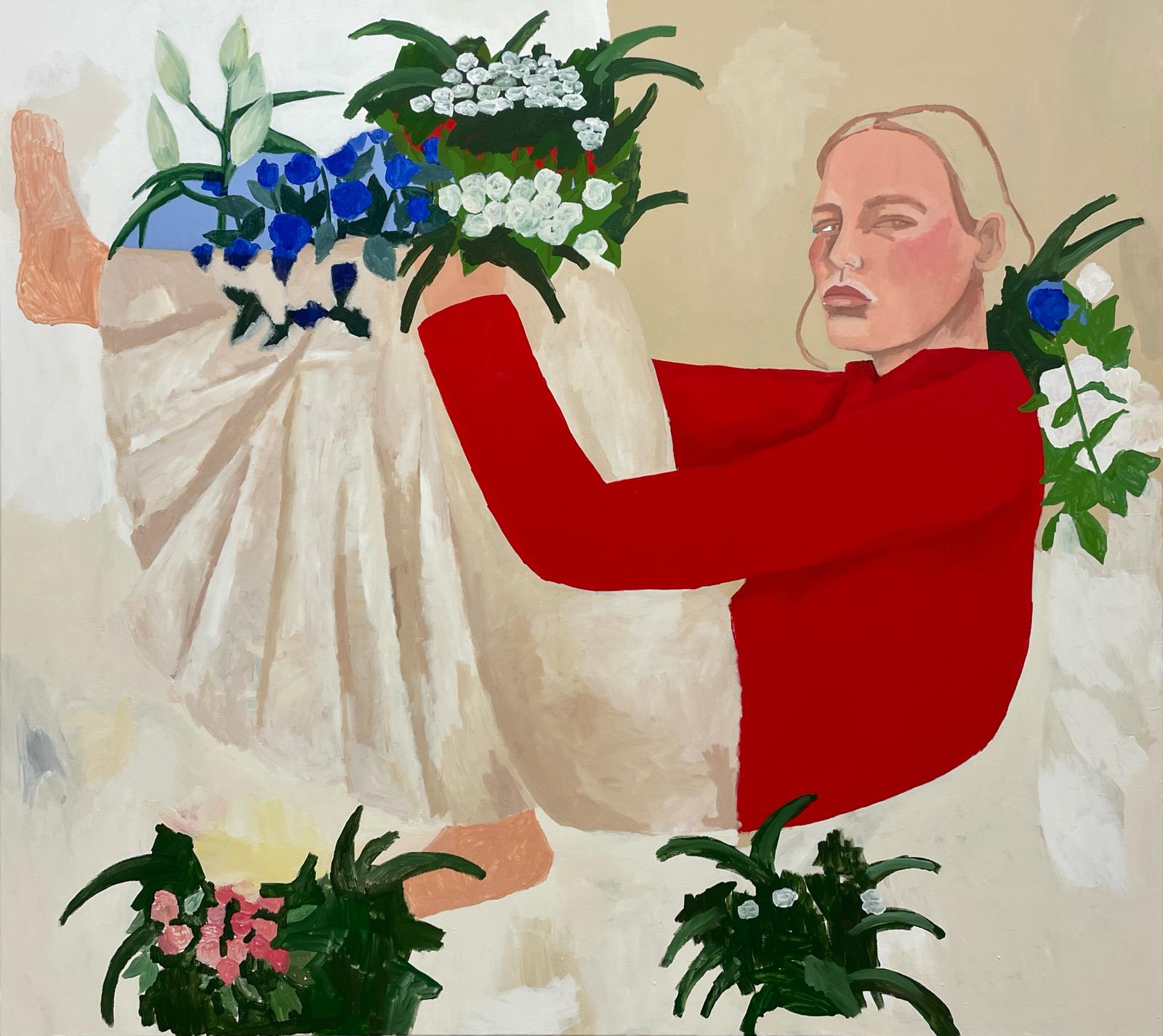

1999 in Berlin, Germany; lives and works in Berlin, Germany
An Artist Interview #31
Lunita-July Dorn

by Lunita-July Dorn
„OCCHIO, MALOCCHIO, PREZZEMOLO E FINOCCHIO“ (Auge,
böses Auge, Petersilie und Fenchel)
2024
Acrylic on canvas
160 x 180 cm
Did you grow up in an artistic family?
No, not really. My father is a total handyman. He and my mum are both punks or former punks from the left-wing scene and they tended to be survival artists. They're both definitely very interested in art and it's always been creative at home, I'd say. That was simply part of it. We were totally given the freedom to do handicrafts or paint.
Bist du in einer künstlerischen Familie aufgewachsen?
Ne, nicht direkt. Mein Vater ist total der Bastler. Er und meine Mutter sind beide Punks oder ehemalige Punks aus der linken Szene und da war man eher Überlebenskünstler. Die beiden interessieren sich auf jeden Fall sehr für Kunst und es war schon immer kreativ, zu Hause, würde ich sagen. Das hat halt dazugehört. Uns wurde da auch total der Freiraum gelassen um zu Basteln oder zu Malen.

by Lunita-July Dorn
Glotz nicht so
2024
Acrylic on canvas
155 x 175 cm
How has your painting been evolving in the recent past? What is your focus at the moment, what is currently interesting you?
A lot has happened for me recently, which I then have to filter in order to get back to the calm of painting. When so much happens, you actually think, oh, now it must be boiling, now it's going to start again. And sometimes I need time to really process it all a bit or think about it. At the moment I just really want to paint again and have realised that the process is going much faster. First and foremost, it was fun again. Sometimes I just paint over almost everything again. It's also really funny to stand in front of my painting and see how many layers there actually were in the painting, to see how the painting changes. It's really freeing to know that you don't always have to leave a picture as it is, that no-one tells me what the end is. After all, it's my painting. Something has definitely changed. Everything usually happens very spontaneously for me anyway, as I don't plan much of what I do.
Wie hat sich deine Malerei in der jüngsten Vergangenheit entwickelt? Was ist gerade dein Fokus, was beschäftigt dich?
Bei mir ist in letzter Zeit viel passiert, was ich dann erstmal filtern muss, um wieder in die Ruhe des Malens zu kommen. Wenn so viel passiert, denkt man ja eigentlich, oh, jetzt muss das brodeln, jetzt geht das direkt wieder los. Und manchmal brauche ich dann aber erstmal, um das alles wirklich irgendwie so ein bisschen zu verarbeiten oder drüber nachzudenken. Grade habe ich einfach total Lust, wieder zu malen und habe dadurch gemerkt, dass der Prozess viel schneller geht. Es war dann in erster Linie auch wieder der Spaß. Manchmal kommt es vor, dass ich fast alles einfach nochmal übermale. Es ist ja auch total lustig vor meinen Bildern zu stehen und zu sehen, wie viele Ebenen das eigentlich in diesem Bild dann schon waren, also zu sehen, wie sich das Bild verändert. Das ist voll befreiend zu wissen, dass man ein Bild nicht immer so stehen lassen muss, dass mir niemand sagt was das Ende ist. Ist ja mein Bild. Es hat sich auf jeden Fall was verändert. Es passiert ja eh meistens alles sehr spontan bei mir, da ich wenig plane, was ich mache.

by Lunita-July Dorn
Zu Besuch beim Marlboro man
2024
Acrylic on canvas
160 x 180 cm

by Lunita-July Dorn
Naund?
2024
Acrylic on canvas
160 x 200 cm
It seems as if your recent experiences, how you felt, what you experienced, had more of an impact on the process and less on the actual subject matter of the work. For example, the feeling of calm and lightness that went hand in hand with overpainting and a faster way of working. As a viewer of your works, however, one has the feeling that your figures and portraits are self-portraits. How much self-portrait is there in your paintings?
I would describe it as a self-portrait because the work has a lot to do with myself and also with where I am at the moment or how I'm feeling. And I can always be seen somewhere in most of the pictures. But I'm not interested in making myself visible in the pictures for the viewer. For me, it's not an exact self-portrait, but it's me in my world, in my inner and emotional world or in my own memories.
Es scheint, als würden deine Erfahrungen in der letzten Zeit, wie du gefühlt hast, was du erlebt hast, sich mehr auf den Prozess ausüben und weniger auf die Inhalte der Arbeiten. Beispielsweise das Gefühl der Ruhe und Leichtigkeit, das dann mit dem Übermalen und einer schnellen Arbeitsweise einherging. Als Betrachter:in deiner Werke hat man allerdings das Gefühl, dass deine Figuren und Porträts, Selbstporträts sind. Wie viel Selbstporträt steckt in deinen Bildern?
Ich würde es schon als Selbstporträt bezeichnen, weil die Arbeit viel mit mir selbst zu tun hat und auch mit dem, wo ich mich gerade befinde oder wie es mir gerade geht. Und ich dann schon immer in den meisten Bildern irgendwo auch zu sehen bin. Aber es geht mir nicht darum, mich sichtbar in den Bildern für die Betrachtenden zu machen. Es ist für mich kein absolutes Selbstporträt, aber es bin ich in meiner Welt, also in meiner inneren und meiner Gefühlswelt oder in meinen eigenen Erinnerungen.

by Lunita-July Dorn
Schön war’s gewesen
2023
Acrylic on canvas
150 x 170 cm

by Lunita-July Dorn
Rot+Blau, Blau+Rot=Das.
2022
Acrylic on canvas
150 x 170 cm
What was the process of discovering your very own visual language?
I've always drawn and painted incredibly much. As a child, I used to read a lot of comics, where you don't actually have to read the text, it's all about the pictures, they're illustrated stories. I thought it was a really nice way to express oneself. And I kept going like that. After I dropped out of school, I first tried out lots of things, apprenticeships and internships. But I always knew that I wanted to paint. Then I applied to the Kunsthochschule Weißensee and I was accepted. At the beginning, it was quite a change to suddenly present myself to the public, especially with the unfinished works. Before that, I only painted for myself. At home at my mum's place and then in my room in the WG. But I think it was also really good for me to somehow find a better visual language. It also took a bit of time. In the beginning, I would say I was more overthought in my work. It's important to me to keep moving, one's own visual language is constantly evolving and you always have to keep an open mind when working. I don't want to commit myself to any visual language.
Wie verlief der Prozess, in dem du zu deiner ganz eigenen Bildsprache gefunden hast?
Ich habe schon immer unglaublich viel gemalt und gezeichnet. Als Kind habe ich total viele Comics gelesen, wo man ja eigentlich die Texte gar nicht groß lesen muss, sondern da geht es um die Bilder, es sind Bildergeschichten. Ich fand das ne total schöne Art und Weise sich auszudrücken. Und so habe ich immer weiter gemacht. Nachdem ich die Schule abgebrochen habe, probierte ich erst mal total viele Sachen aus, Ausbildungen und Praktika. Aber ich wusste eigentlich schon immer, dass ich Malen wollte. Dann habe ich mich an der Kunsthochschule Weißensee beworben und ich wurde angenommen. Am Anfang war das ne Umstellung, wenn man sich plötzlich einer Öffentlichkeit präsentiert und auch gerade unfertige Sachen. Vorher habe ich nur für mich gemalt. Bei meiner Mutter damals noch zu Hause und dann bei mir in der WG in meinem Zimmer. Ich glaube, es hat mir aber auch ganz gut getan, gerade dadurch irgendwie eine bessere Bildsprache zu finden. Es hat schon auch ein bisschen gedauert. Am Anfang war ich verkopfter beim Arbeiten, würde ich sagen. Mir ist es wichtig in Bewegung zu bleiben, die eigene Sprache entwickelt sich immer weiter und man muss beim Arbeiten immer offen bleiben. Ich will mich auf keine Bildsprache festlegen.

by Lunita-July Dorn
Blaue Rose 3,50€
2024
Acrylic on canvas
180 x 200 cm

by Lunita-July Dorn
würd‘ ich gern behalten, aber kann ich mir nicht leisten
2024
Acrylic on canvas
220 x 260 cm

by Lunita-July Dorn
Biste blau siehste rot
2024
Acrylic on canvas
150 x 170 cm
What role do identity and femininity play in your work?
Quite a big role. I'm with myself all day long and since I actually paint most of the time, I think I have no choice but to confront myself and let that flow into my work. I just ask myself how am I at all? Or why do I do some things the way I do them, including painting. Sometimes you're like this, sometimes you're like that. I actually grew up almost exclusively with women and that was something totally normal and beautiful for me. And I don't know any other way. My work is often associated with femininity, but I honestly don't think about it that much when I'm working. But of course I also think it's important to show women and to show femininity, because that's what I am. But I also think it's funny because, no offence to you, but a man probably wouldn't be asked.
Welche Rolle spielt Identität und Weiblichkeit in deinen Arbeiten?
Schon eine große Rolle. Ich bin ja den ganzen Tag mit mir und da ich eigentlich auch die meiste Zeit male bleibt mir glaub ich nichts anderes übrig als dass ich mich mit mir selber konfrontiere und das in meine Arbeit einfließen lasse. Ich frage mich einfach viel wie bin ich überhaupt? Oder warum mache ich manche Sachen so wie ich sie machen, auch das Malen. Mal ist man so, mal ist man so. Ich bin eigentlich fast nur mit Frauen aufgewachsen und das war für mich was total Normales und was Schönes. Und das kenne ich auch nicht anders. Meine Arbeit wird oft mit Weiblichkeit in Verbindung gebracht, aber ich denke da ehrlich gesagt beim Arbeiten gar nicht so viel darüber nach. Aber natürlich finde ich das auch wichtig, Frauen zu zeigen und eine Weiblichkeit zu zeigen, weil ich das ja auch nun mal bin. Ich finde das aber auch lustig, weil, also jetzt gar nichts gegen dich, aber dass ein Mann wahrscheinlich auch nicht gefragt werden würde.
Photo: Luis Bortt
Photo: Luis Bortt
Photo: Luis Bortt
Photo: Luis Bortt
Photo: Luis Bortt
Contact
interview
Luis Bortt